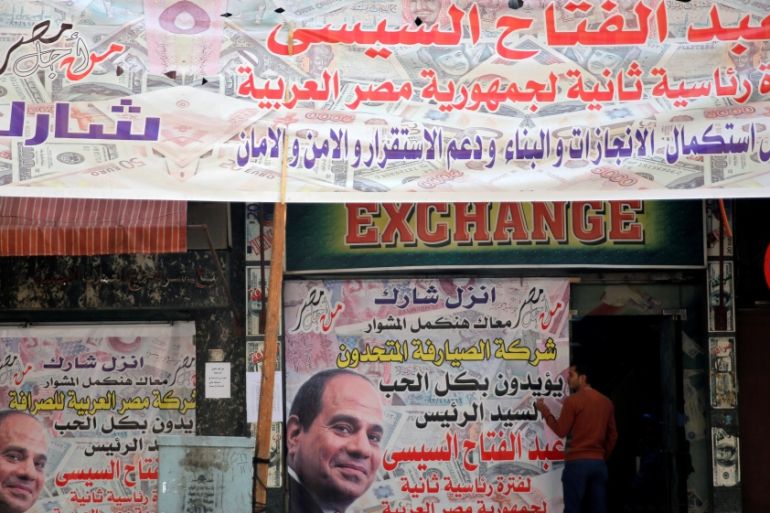How Egypt targets ‘fake news’ ahead of elections
Egyptian prosecutors have long urged that critical outlets should be silenced.

As the Egyptian presidential election, to be held between March 26 and 28 nears, Egypt turns its attention to news outlets and journalists it accuses of spreading lies. These include some foreign media, such as the BCC, and even one pro-government commentator.
Here is how Egyptian authorities charged reporters with “treason” and “lying”.
Fake news charge
-
Hotline: The public prosecutor called for legal action over what he deems fake news, saying the “forces of evil” are undermining the Egyptian state.
-
The public prosecutor even announced telephone hotlines for citizens to report “news relying on lies and rumours”.
- “The state is now using [the fake news charge] to harass journalists – anyone that publishes information they don’t want,” Fatma Serag, an AFTE lawyer who works with journalists, said.
-
Documentary film: Mostafa al-Asar’s lawyer said he had barely started work on a documentary, critical of Egypt’s President Abdel Fattah el-Sisi when police arrested him on February 4, and charged him with publishing “fake news”.
-
The journalist was arrested before he had even begun filming, his lawyer said. The government did not respond to requests for comment.
-
According to his lawyer, the documentary maker Asar was setting up interviews for a film about Sisi supporters turned dissidents when he was arrested on his way to work.
-
“(Asar) was talking to a guest to coordinate an interview and the call was recorded and monitored,” Halim Hanish, his lawyer, said.
-
Another journalist, Hassan al-Banna, was arrested with him as they rode in a bus together “simply because he happened to be with Asar,” Hanish said.
-
The two could now face jail after being charged with publishing false news and joining an outlawed organisation, typically a reference to the banned Muslim Brotherhood, Serag said.
Treason charge
-
Authorities say curbing fictitious news is necessary for national security. They regularly accuse outlets of a lack of professionalism in covering Egypt and urge reporters to use only official outlets as sources.
-
Sisi weighed in on March 1, saying that anyone who insults the army or police – and by extension himself as commander in chief – is guilty of treason.
-
His words prompted legislators to consider new legislation that would jail such offenders for up to three years, according to pro-government media.
BBC report
-
The debate over media standards heated up last month when the BBC released a report on human rights detailing the alleged forced disappearance of an Egyptian woman who later appeared on a pro-government talk show to refute the claim.
-
Egypt’s government press centre said the BBC report was “flagrantly fraught with lies” and urged officials to boycott the British public broadcaster.
-
The BBC said it “stands by the integrity” of its reporting teams. A Cairo court has said it will in April hear a case filed by a lawyer over the report, calling for the closure of the BBC’s Cairo office.
Arrests
Figures from the Cairo-based AFTE show that at least six journalists have been arrested in Egypt during the first two months of 2018, and that 18 were arrested in 2017.
-
TV presenter: Egypt’s campaign against the media has included state television presenter Khairy Ramadan, whose brief detention prompted alarmed comments by pro-government talk show hosts who rarely speak out against authorities.
-
“Khairy Ramadan (and other Egyptian journalists) are not our enemy – he’s a national broadcaster,” TV host Amr Adib said on his nightly show last week.
-
Ramadan, who was questioned for defaming the police after a segment on an officer’s family struggling to get by financially, was released on bail last week. Neither Ramadan or his lawyer could immediately be reached for comment.
-
Al Jazeera‘s journalist Mahmoud Hussein was arrested and imprisoned and has now been behind bars for 456 days.
-
Al Jazeera has demanded Hussein’s immediate release, saying that he was in Egypt on holiday and not for work.
-
In 2015, Sisi pardoned three Al Jazeera television journalists who had been jailed for three years for operating without a press licence and broadcasting material harmful to Egypt.
Reactions
-
Regulator: Makram Mohammed Ahmed, head of Egypt’s Supreme Media Council, a state media regulator, voiced concerns about media standards.
-
“I no longer believe that there’s an independent press, or that there’s professionalism … there is a lack of accuracy, whether in Egyptian papers or the foreign press,” he told Reuters.
-
NGO: Rights groups such as the Association for Freedom of Thought and Expression (AFTE) and the Egyptian Commission for Rights and Freedoms say the charge of publishing false news is intended to rein in dissent, targeting journalists, politicians and even pop stars.
- Egypt has also blocked hundreds of websites in recent months in increased censorship of online media, AFTE said.
-
UN: The United Nations rights chief last week criticised Egypt’s crackdown on political and press freedom, describing a “pervasive climate of intimidation” ahead of the election.
-
The UN report said more than 400 media and NGO websites had been blocked. Egypt’s foreign ministry dismissed the comments as “baseless allegations”.